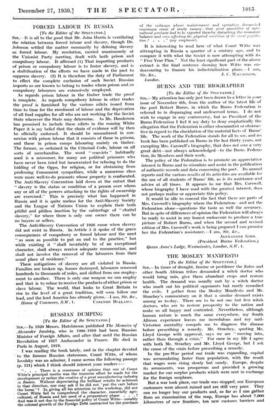. RUSSIAN DUMPING [To the Editor of the SrEcr.vron.1
Sm,—In 1920 Messrs. Hutchinson published The Memoirs of Alexander Isvolsky, who in 1906-1910 had been Russian Minister of Foreign Affairs, and after that until the Russian Revolution of 1917 Ambassador in France. He died in
Paris in August, 1919.
I was reading the book lately, and in the chapter devoted to the famous Russian statesman, Count Witte, of whom Isvolsky was an admirer, I came across the following passage (p. 121) which I think should interest your readers :-
There " . . is a consensus of opinion that one of Count Witte's principal merits was the immense effort he made for the development or rather the creation of a great manufacturing industry in Russia. Without depreciating the brilliant results he achieved in that direction, one may ask if he did not ' put the cart before the hone-' ? -In giving all his attention to the workshop, did not Count -Witte fail to comprehend the character, essentially agri- , cultural, of Russia and her need of a preparatory phase . And was •it not due to the -financial policy of Count Witte—notably the colossal growth of the Ppreign Debt contracted for the purchase of the railways whose maintenance and operation demanded enormous sums of ready money—that great quantities of agri- cultural products had to be ezported thereby disturbing the °commie balance and even affecting the physical condition of the rural popula- tion ? . . ." (my emphasis).
It is interesting to read here of what C t Witte was attempting in Russia a quarter of a century ago, and to compare it with what the Soviet is now attempting with its Five Year Plan." Not the least significant part of the above extract is the final sentence showing how Witte was en- deavouring to finance his industrialization plans. —I am,


































 Previous page
Previous page